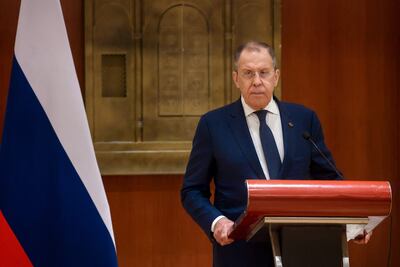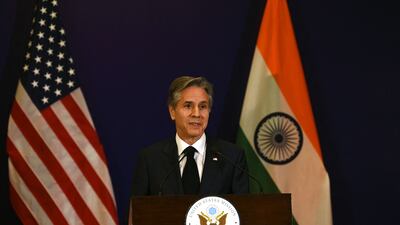US Secretary of State Antony Blinken has urged Moscow to engage in meaningful diplomacy peace in Ukraine during his first face-to-face talks with Russian Foreign Minister Sergey Lavrov since war began.
Mr Blinken met Mr Lavrov briefly in New Delhi on Thursday at the G20 meeting foreign ministers, from which no joint statement was forthcoming amid opposing stances on the conflict taken by Washington and Moscow and their respective allies.
“We met here in Delhi roughly one year after President [Vladimir] Putin launched his war of aggression on Ukraine,” Mr Blinken said. “And one week after 141 countries voted in the UN General Assembly for a resolution that expressed the support for a comprehensive, just and lasting peace.
The Secretary of State told Mr Lavrov: "End this war of aggression, engage in meaningful diplomacy that can produce a just and durable peace.”
He also urged Russia to reverse “its irresponsible decision and return to” participation in the New START nuclear treaty.
“I told the foreign minister that no matter what else is happening in the world or in our relationship, the United States will always be ready to engage and act on strategic arms control, just as the United States and the Soviet Union did even at the height of the Cold War,” he added.
Their encounter, which US diplomats said lasted a mere 10 minutes, came hours after Mr Lavrov had accused the US-led western alliance of employing “blackmail and threats” against Russia.
Russian Foreign Ministry spokeswoman Maria Zakharova played down the interaction, saying Mr Blinken had initiated the talks but no "real meeting" had ensued between them.
"Blinken asked for contact with Lavrov,” she said. “There were no negotiations, meetings, and so on,” she was quoted as saying by Russian state news agency RIA Novosti.
Mr Lavrov did not mention speaking with Mr Blinken in his press conference after the G20 session. He told reporters that Moscow would continue its press in Ukraine and shrugged off western claims of Russia’s isolation, saying “we aren’t feeling isolated”. He added: It’s the West that has isolated itself and it will eventually come to realise it.”
He mocked US threats against China, which has presented a peace plan for Ukraine that has been applauded by Moscow but dismissed by Washington and its allies.
China and Russia objected to two paragraphs taken from the previous G20 declaration in Bali last year, according to a summary of Thursday’s meeting released by India.
The text stated that the war in Ukraine was causing immense human suffering while exacerbating fragilities in the global economy, the need to uphold international law, and that “the use or threat of use of nuclear weapons is inadmissible”.
Despite the failure to achieve consensus on a joint G20 statement, Mr Blinken said it was positive that 18 of the 20 nations had agreed on a statement calling for an end to the war and urgent steps to improve energy and food security that have been badly affected by the conflict.
The meeting was attended by 13 international bodies, including the World Health Organisation, and the foreign ministers of 27 countries apart from India, the current president of the G20. It focused on vital global issues, such as rising food and energy prices, climate change, growing debt and a poor economic recovery after the Covid-19 pandemic and turmoil over the Ukraine conflict.
The stand-off over the war forced delegates to adopt a chair summary and outcome document instead of a joint statement, Indian Foreign Minister Subrahmanyam Jaishankar said, in a repeat of what happened at last week’s G20 finance ministers’ meeting, also hosted by India.
“There were differences on the Ukraine conflict on which there were divergences … there was a chair summary because there were differences, which we could not reconcile between various parties who held differing positions,” Mr Jaishankar said.

Mr Lavrov blamed the US and its allies for the meeting's outcome.
“I would like to apologise to the Indian presidency and colleagues from the countries of the Global South for the indecent behaviour of a number of western delegations, who have turned the G20 agenda into a farce by trying to shift their responsibility for economic policy failures on others, especially Russia," he said.
Experts said the failure to reach consensus on a joint communique had been expected due to the polarised views but added that India had achieved its goals as its focus was on issues posing global economic challenges.
“The glass is three quarters full," Anil Trigunayat, a former diplomat, told The National. "But from India's perspective, all the key boxes have been ticked. It would have been ideal if we had the statement or communique. The working groups will have to continue to work on the other things."
With reporting from agencies


